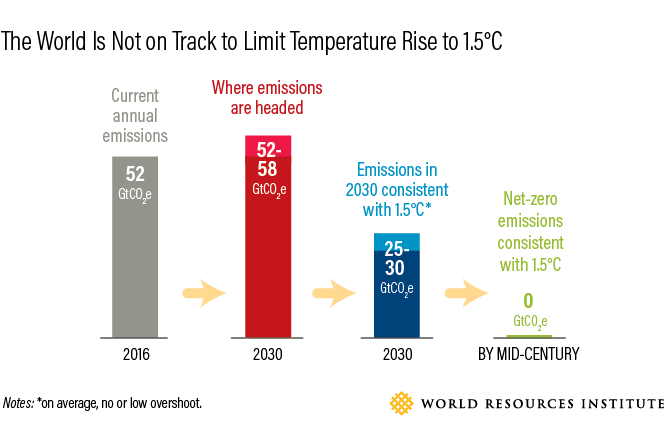World Economic Forum
CO2 Can Be a Valuable Raw Material. Here’s How

Source:Shu-yu Chou
What if we did something with carbon emissions, instead of continuing to try and contain them on a massive scale?
Views
CO2 Can Be a Valuable Raw Material. Here’s How
By Markus Steilemannweb only
The world is off track on climate action, with global warming heading towards 3°C this century, according to the latest report by the Intergovernmental Panel on Climate Change (IPCC). We used to think that if we could keep warming below 2°C, then the changes we would experience would somehow be manageable. But the IPCC’s report states that even going past 1.5°C is gambling with the planet's liveability.
While the negotiators at the 24th UN Climate Conference in December 2018 secured agreement on a range of measures that will make the Paris Agreement operational in 2020, now is high time to plan action - in cities, rural areas, energy systems, construction, transport and industry.

Action is expected from the sector that I represent - the chemical industry. It produces many useful products that we can hardly do without, from medications, adhesives and cleaning products to high-quality engineering plastics. However, producing these materials consumes a great deal of energy and natural resources, and releases a significant amount of carbon dioxide (CO2) into the atmosphere.
Thanks to modern processes and constant efforts, a lot less is released than previously. However, in Europe alone, industrial processes are the third-largest emitter of greenhouse gases. Still, the chemical industry is a key enabler for a more sustainable future, and part of the solution.
One example of thinking differently is CO2. What if we did something with it, instead of continuing to try and contain it on a massive scale? One promising pathway is using this climate destroyer as a useful raw material, to provide the valuable carbon that the chemical industry so heavily relies on. In doing so, we would need fewer raw materials from fossil sources such as petroleum.
There is a growing movement utilizing non-fossil resources, such as carbon dioxide and plants. This constitutes an important facet of the circular economy, which is still in its infancy. But moving in a circle doesn’t just mean recycling; rather, the entire cycle must be considered.
All the various actors in the cycle must cooperate. A prime example of collective action in terms of material cycles is Carbon4PUR. This pan-European, large collaborative project studies how smelting gases, including CO2, from steel production can be used to produce chemicals and end products. The consortium is made of 14 partners from seven countries and comprises the whole value chain.
I’m certain that sooner or later, CO2 as a resource will become an economic factor. Several companies around the world are already developing new technologies and business ideas around CO2-based products. Unlocking the potential of these ideas doesn’t just require political support - acceptance by society at large is also needed. And the financial sector has the opportunity to channel venture capital into new raw materials, stimulating the start-up scene.
The chemical and plastics industry would be well-advised to explore this topic, as it could help in reaching ambitious climate targets. As a key sector, this industry has considerable influence over its products and how they are developed, and therefore can impact the sustainability balance and climate effect of downstream industries.
Above all, it is the sound economic argument that should prompt the chemical industry to look around for alternatives to petroleum and expand its resource base. It will have to prepare for the fact that generating greenhouse gases may cost more in the future. But this new approach will help meet the growing consumer demand for products made in a sustainable and climate-neutral way.
It is often said that those who run in circles never get far. In the case of resource efficiency, I beg to disagree.
Edited by Sharon Tseng
Original content can be found at the website of World Economic Forum: CO2 can be a valuable raw material, not just a climate killer. Here’s how
This article is reproduced under the permission of World Economic Forum (WEF) and terms of Creative Commons Attribution-NonCommercial-NoDerivs 4.0 Unported License (“CCPL”). It presents the opinion or perspective of the original author / organization, which does not represent the standpoint of CommonWealth magazine.







